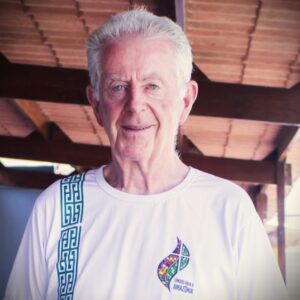By Fr. Peter Hughes, Coordinator, Indigenous and Human Rights, Red Eclesial Pan-Amazónica


The 2023 United Nations Climate Change Conference of the Parties of the United Nations Framework Convention on Climate Change (COP28) starts today in Dubai. Had illness not intervened, Pope Francis would have been there to urge and inspire delegates with his familiar message of ecological conversion.
To mark the occasion, we bring you this reflection by Fr. Peter Hughes, an Irish priest based in Peru for over 35 years. He works for the Red Eclesial Pan-Amazónica (REPAM), an ecclesial network with which Development and Peace ― Caritas Canada has had a close relationship and which had played a central role in the Synod of Bishops for the Pan-Amazon region in 2019.
This article first appeared in Spanish in Revista Signos, a progressive magazine published by our Peruvian partner, the Instituto Bartolomé de Las Casas. It has been reproduced here with their permission.
Faced with the dramatic reality of the deteriorating global warming crisis, the Pope has just expressed his concern in Laudate Deum on October 4, reiterating with renewed energy what he had said in Laudato Si’ eight years ago about the defence of the common home. He is concerned about the progressive melting of the poles, the rise and warming of the oceans, floods and more prolonged droughts. Peru is a very vulnerable country, and the signs are clear: this year’s floods on the north coast are a warning of what the coming El Niño could cause. The disappearance of the snow-capped glaciers of the Cordillera Blanca in the Santa Valley will have an impact on access to water in cities like Lima. The planet is the victim of a deadly silent disease.
There is no doubt about the human origin of climate change, which is caused by the emission of toxic gases, including greenhouse gases such as carbon dioxide, into the atmosphere. Pope Francis warns that “in just ten years we will reach the recommended maximum global ceiling of 1.5° C,” a prognosis supported by an overwhelming majority of scientists. The world is dangerously close to a point of no return. According to Carmelite scientist Eduardo Agosta, “the traffic light is yellow, and we are about to cross the red line.” We are just in time to avoid even more drastic damage.
Pope Francis reminds us that the technocratic paradigm is behind the process of environmental destruction. The illusion is “as if reality, goodness and truth automatically flow from technological and economic power.” Artificial intelligence is one more step for self-sufficient and limitless human power. It sends shivers down the spine that a small group with knowledge and, above all, economic power has so much dominion over humanity. Technology has produced admirable progress, but atom bombs have also killed entire peoples. “Technological development has not been accompanied by a development in human responsibility, values and conscience,” the Pope says.
Humans are part of nature, we are included in it, we cannot survive without it (Laudato S1’, 139). It is urgent to replace our aggressive, destructive relationship with the natural order with a new one based on respect, balance and harmony. Listening to the cry of the earth and the cry of the poor is imperative. The mantras “everything is connected” and “no one is saved alone” resonate. Pope Francis highlights the wisdom of Indigenous people. The cry of the Guaviare people has an impact: “We are water, air, earth and life of the environment created by God. For this reason, we demand an end to the mistreatment and destruction of Mother Earth. The land has blood, and it is bleeding; the multinationals have cut the veins of our mother Earth” (Querida Amazonia, 42).
The Pope acknowledges the weakness of international politics. The old “multilateralism with a world authority concentrated in one person or in an elite with excessive power” is in crisis. He calls for a new multilateralism built “from below” in this new global situation. Pope Francis invites us to recognize that “many groups and organizations within civil society help to compensate for the shortcomings of the international community, its lack of coordination in complex situations, its lack of attention to fundamental human rights” (Fratelli Tutti, 30). This evokes the importance of popular movements for Pope Francis.
The agreements reached at COP21 in Paris on reducing emissions are important, but unfortunately have not been fulfilled. On the eve of COP 28, to be held in Dubai from November 30 to December 12, the Pope is once again taking the lead, demanding “binding forms of energy transition that meet three conditions: that they be efficient, obligatory and readily monitored.” To achieve this, he stresses “three requirements: that it be drastic, intense and count on the commitment of all.” This is the only way for “international politics to recover its credibility, since only in this concrete manner will it be possible to reduce significantly carbon dioxide levels and to prevent even greater evils over time” (Laudate Deum, 59). May his words be heard and put into practice.

